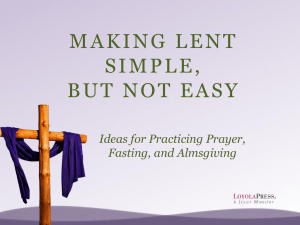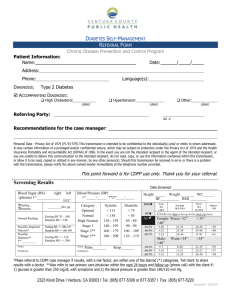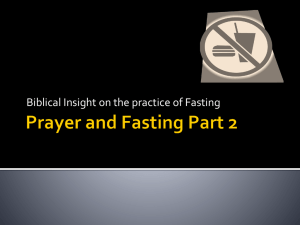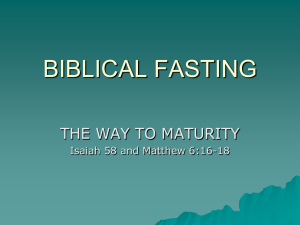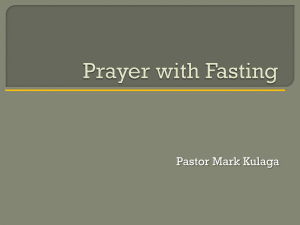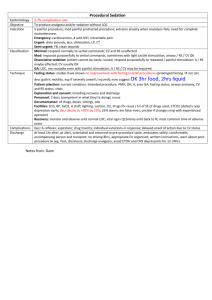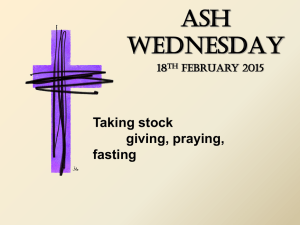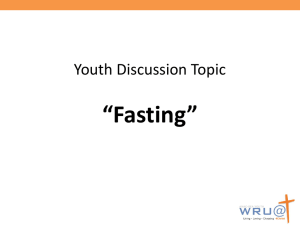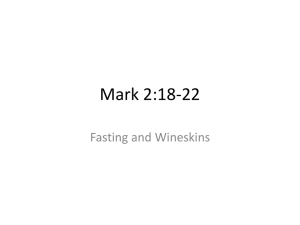on_fasting - Zion Evangelical Lutheran Church
advertisement
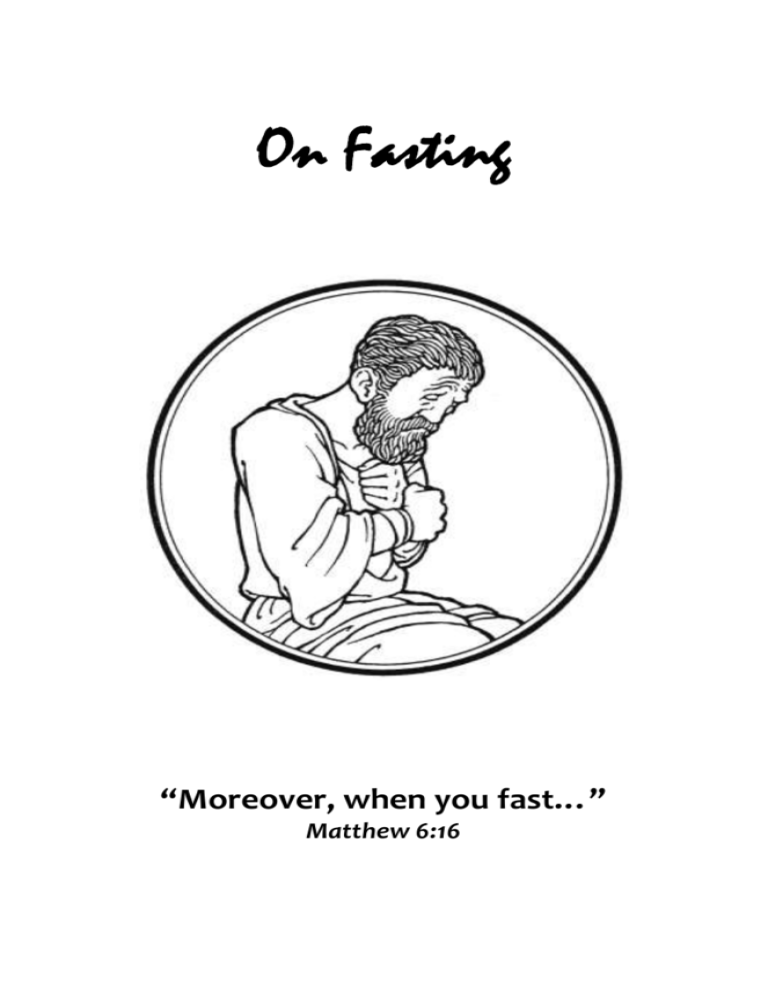
On Fasting “Moreover, when you fast…” Matthew 6:16 On Fasting Fasting is an act of bodily discipline. Regarding preparation for receiving Holy Communion, our Catechism says “Fasting and bodily preparation are indeed a fine outward training…” Not eating at the regular time brings an immediate response from the body. When we feel hunger, we remember how frail the flesh is. This reminds us of our weakness, for hunger is but a little taste of death. Confronted with our weakness, we confess our need for a Savior. So fasting is frequently part of repentance. Perhaps you have never thought of it in this way, but there was fasting in Eden before the fall. In keeping God’s command not to eat of the fruit of the tree, Adam and Eve fasted from that tree, demonstrating their trust in God by their obedience to Him. Indeed, not eating from that tree was an act of worship. After the fall into sin, throughout the Old Testament, God’s people engaged in fasting. In the Scriptures fasting is frequently accompanied by prayer as an act of worship and repentance. Consider the declaration of God through the Prophet Joel, read among us every Ash Wednesday: “Blow the trumpet in Zion, Consecrate a fast, Call a sacred assembly; Gather the people, Sanctify the congregation” Joel 2:15-16 In the New Testament our Lord Himself fasted, as we read in Matthew 4:2: “…and when He had fasted forty days and forty nights…” So too did His Disciples fast. Jesus says to them “Moreover, when you fast…” Matthew 6:16. He does not say “if you fast,” but “when you fast”. His expectation is that they would fast. So does our Lord say of His Disciples: “But the days will come when the bridegroom will be taken away from them, and then they will fast.” Matthew 9:15 So has the Christian Church observed fasting from the earliest days and throughout the centuries. Fasting is not something that the Church commands in order that men earn favor with God. This would be a gross confusion of Law and Gospel. Our works can not save us. Salvation comes by God’s grace through faith in Jesus Christ alone. Christians, however, have always seen fasting as a beneficial exercise of discipline over mind and body, indeed even a God-pleasing act. Our Lutheran Confessions teach “… repentance ought to bring forth good fruits for the sake of God’s glory and command, and good fruits, true fastings, true prayers, true alms, etc., have the commands of God…” Ap. XII.139 Luther, speaking about fasting, said “It is right to fast frequently in order to subdue and control the body. For when the stomach is full, the body does not serve for preaching, for praying, for studying, or for doing anything else that is good. Under such circumstances, God’s Word cannot remain. But one should not fast with a view to meriting something by it as by a good work.” What Luther Says, 506 It is in this spirit, following the Words of the Old and New Testaments, the example of Christ and His Disciples, the tradition of the Church, and the Confessions of our Church, that we at Zion encourage the Christian to fast appropriately and as faith compels. To assist in this, we publish anew the following suggestions to guide fasting: Every Friday Abstain: Exceptions: From all meat (except fish) Fridays from Dec 25—Jan 13 Fridays from Easter Sunday until Pentecost Sunday Fridays on which a major feast falls (4 June; 24 June; 29 June; 15 Aug; 29 Sept; 1 Nov) Sunday Eucharistic Fast Fast: From all foods after midnight until after receiving the Sacrament on Sunday Exceptions: None Weekday Eucharistic Fast Fast: From all foods after midnight until after receiving the Sacrament Exceptions: If Mass is celebrated in the evening (Wednesdays in Advent & Lent; Christmass Eve; Ascension Day), then fast from all foods 3 hours before the Mass Advent Abstain: Special: Exceptions: From all meat (except fish) on Wednesdays and Fridays in Advent On the Ember Days (the third Wednesday, Friday and Saturday in Advent) and on 24 December, abstain from all meat (except fish) and eat only one full meal after Vespers (6:00 p.m.) plus two ¼ meals during the day December 8 December 24 (when it falls on a Sunday) Lent & Passiontide Abstain: From all meat (except fish) on Ash Wednesday, and all Fridays and Saturdays in Lent Fast: Eat only one full meal after Vespers (6:00 p.m.) plus two ¼ meals during the day every day except Sunday Special: On the Ember Days (the first Wednesday, Friday and Saturday in Lent), abstain from all meat (except fish) and eat only one full meal after Vespers (6:00 p.m.) plus two ¼ meals during the day Exceptions: March 17; March 25 (unless it occurs during Holy Week) Rogation Tide Abstain: From all meat (except fish) on the Monday, Tuesday and Wednesday before Ascension Day Pentecost & September Ember Days Dates: The Wednesday, Friday and Saturday after Pentecost Day The Wednesday, Friday and Saturday after 14 September Custom: Abstain from all meat (except fish) and eat only one full meal after Vespers (6:00 p.m.) plus two ¼ meals during the day Other Times Dates: Custom: Exceptions: 7 December The Saturday before Pentecost Sunday 14 August Abstain from all meat (except fish) and eat only one full meal after Vespers (6:00 p.m.) plus two ¼ meals during the day These rules are ignored if the day falls on a Sunday Notes: Fasting is practiced in conjunction with increased prayer and almsgiving Simple inexpensive foods (soups, vegetables, etc.) during fasting maintain the spirit of the fast House rules may also be established (e.g., abstain from wine when abstaining from meat, etc.) During Lent, married couples are encouraged to follow St. Paul’s admonition in 1 Cor 7.5 Excepting Advent and Rogation tide, these rules follow the norms of the western church prior to the reforms after Vatican II Fr. Mark Braden, Invocabit, 2012 A. D. Guidelines for fasting compiled by Fr. John W. Fenton Zion Evangelical-Lutheran Church 4305 Military Detroit, Michigan (313) 894-7450 www.ziondetroit.org
